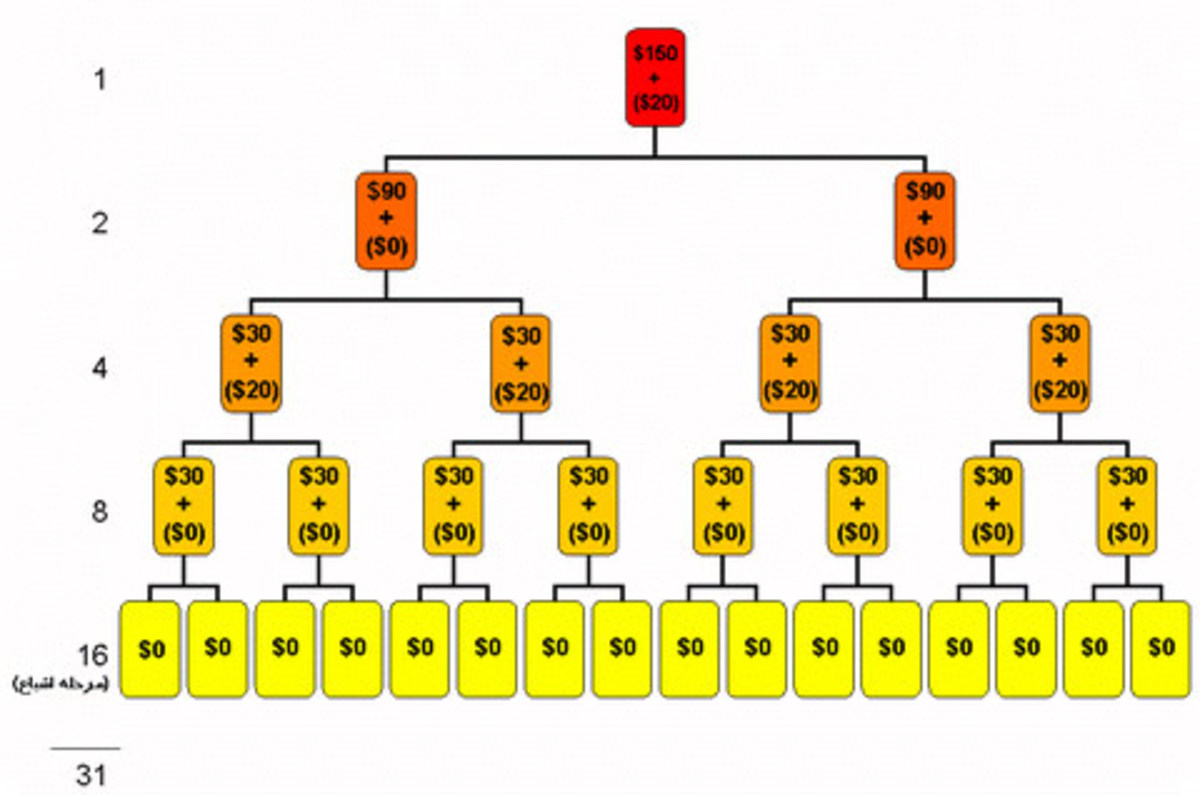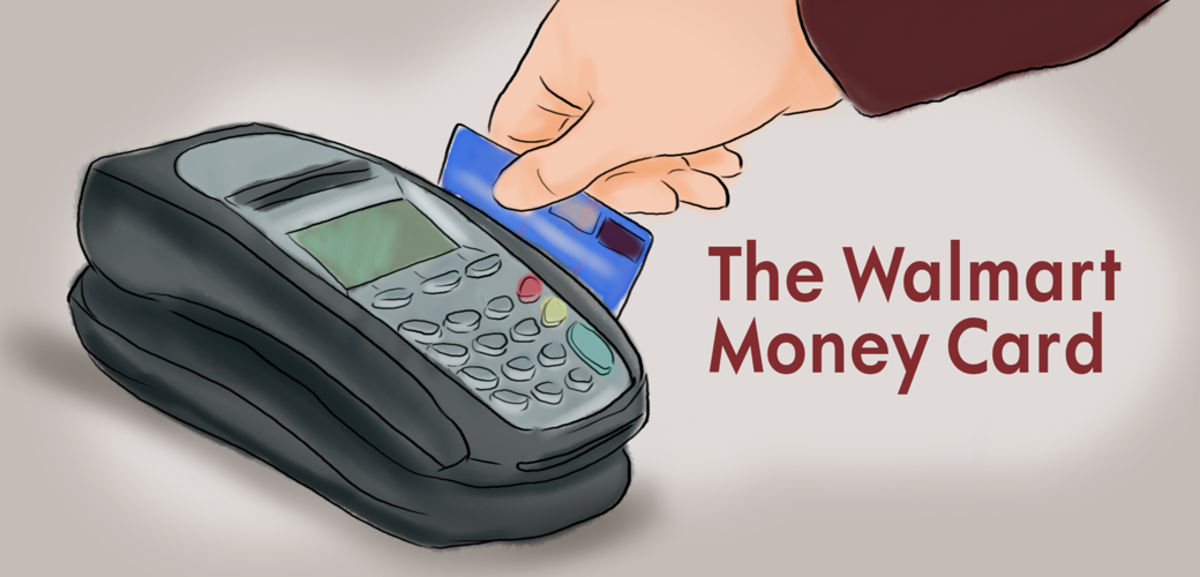"Pay To Assassinate The President" and Other Dark Website Scams You Should Know About

Let The Dream Selling...Begin
It has been said that, "If it seems too good to be true, it probably is...too good to be true", which is the case for most things wildly incredible. The "dark web", is the quickest place to validate that saying to a "T". It's also the best place on the internet to validate the claim that "a sucker is born every minute". Are you one of those suckers?
No one wants to be, obviously, but when it comes to indulging in forbidden internet content and services, it's easy to pitfall your way to the monicker. You'd be surprised.
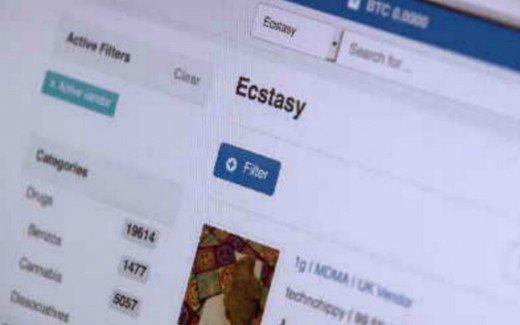
A Brief Recap
It could be argued that the "darknet" or "dark web" started before the actual Facebooky, Google strewn internet we all know and love. When Charley Kline, a student at the University of California, Los Angeles, typed out the first message between computers connected by ARPANET (It was "LOGIN" by the way, but only the first two letters made it), back in October 29, 1969, it was to no fanfare. No Earths were shattered, but unseen communications via an internet began that day and soon after parallel "darknets" emerged.
What those "darknets" were for is largely hearsay, though given the limitations of technology at the time, one can assume that it was for "coded" messaging or to relay some form of hidden transmission of sensitive materials, not commonly associated with the content of today's internet.
How The Internet Showed Up
The Darknet Rises
During the 90's individuals were exchanging "illegal" content amongst themselves, but it wasn't until the internet's peer-to-peer data and file transmission gave rise to decentralized hubs, where most illegal music and movie files originated. They were password-protected and known only to insiders. Then, Napster, kicked open the flood gates, to even the passing internet user, and facilitated millions of file transfers per day.
Soon after, "Freenet", created by Ian Clarke, the ugly godfather of the "Dark web", sprang to life. It was touted to offer "everything from child pornography to instructions on how to build explosives". Ian Clarke even went so far as to tell the New York Times. "I have two words for … companies trying to halt free file-sharing: Give up."
Ouch.
So, the "dark web's" bad boy reputation began to take hold. However, the invention of the TOR ("The Onion Router") browser, which conceals the location and IP of a user, really solidified and gave the "darknet" it's browser friendly experience.
Years later, in 2009 Bitcoin is developed, and due to it's "untraceable" nature, it soon becomes the premiere way to pay for things anonymously, becoming the de-facto currency of the "darknet".
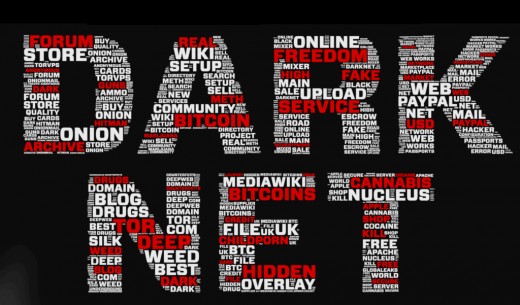
Yet the attraction persists with the offer of electronics, prescription drugs, illegal drugs, gray market goods and stolen identities at rock bottom prices. Someone with even a passing interest may be willing to roll the dice on a dicey deal with the potential to double or even triple their money instantly.
As with most sweet deals, especially when money is involved, things aren't always as they appear.

The Tijuana of The Internet
Like Las Vegas, destinations that develop a seedy, mysterious aspect that is said to serve up humankind's darkest desires on a platter, tend to attract tourists. People that want to stroll the streets of debauchery to stare in wonder at the attractions and perhaps entertain the thought of indulging themselves or just indulging.
People being people, the same need to check out what is forbidden applies to the internet, of course. The darkest of the dark, most deplorable place known on the internet, is none other than the "dark web". Human curiosity being what it is; can't resist a "Do Not Enter", "Beware" warning. Naturally, curious sideshow seekers and pseudo-villains alike flock to it's dimly lit corridors looking for adventure on the wildside of the internet. Others still, come for much more; perhaps to join in the festivities or buy some forbidden service or product.
The attraction persisting with the offer of electronics, prescription drugs, illegal drugs, gray market goods and stolen identities at rock bottom prices. Someone with even a passing interest may be willing to roll the dice on a dicey deal with the potential to double or even triple their money instantly.
What they find, however, upon first arrival is much like the real world counterparts, a mainstreet filled with exactly what they expected; a plethora of dealers offering a slew of easy access illegalities. Nefarious services of all kinds at the ready and just waiting for your dollar or pound; from money laundering to insanely cheap high end merchandise. The darkside tourists think to themselves, "Man, this is so easy, it's insane."
What they should be asking is, "Why are they making this so easy?"

The Map to The Stars Scam
If you want to kill a president, buy a stolen PayPal account or even quench your heroin thirst, can it be this easy? Is it all a mouse click and a few keystrokes away?
It's all there, or so the ads lead you to believe. The dark web is a murky place for even the most experienced of it's denizens. As a tourist, it's even more convoluted and opaque. Where to go for certain goods or services isn't as easy as a simple Google search and the merchants aren't held to any law abiding standard.
Things are hard, but you have to start somewhere. So, like a tourist visiting any other destination, the uninitiated seek out a map.
Newcomers, by nature, don't know where to start, so they do what comes natural: do a Google search.
Typing in something like: "Deep web links" or "Dark web site list", will usually render something pretty quickly. Arriving under the moniker "Hidden wiki" or some such derivative (there are loads of hidden wikis), the deep web tourist hits what they believe is pay dirt. Then, with list in hand (or on screen) they copy and paste their newly acquired addresses into a TOR browser and they're off.
Low and behold...there's the dirty deep web everyone talks about...sort of.
As it happens with all things shady, people dealing in illegal things tend to not...hang around in one place too long. This is good for business and bad for the tourist. "The Hidden Wiki" in it's many incarnations is only, somewhat, passingly useful. It's a list of popularly travelled websites on the "darknet", for the most part. However, it's also riddled with dead links (sites tend to pop up and disappear fairly regularly, and as explained before about not hanging around) and a lot of sites that are just plain scams (scams that will be explained later).
The better bet is to use a well regarded TOR search engine, like Torch to seek what ye shall find. Though, there are interesting links on "The Hidden Wiki", it's pretty hit or miss (which is usually you missing your money/identity/who knows what).

Bitcoin Is King Scam
The biggest reason for the prevalence of scams on the Internet's darkside can be traced directly to Bitcoin.
Bitcoin is the currency used in transactions on the Dark Web. Credit cards and money orders could be used, but with the legal entanglements, rampant theft of credit card information involved, and betrayal of anonymity most transactions are handled using Bitcoin.
Bitcoin acts, more or less, like the digital version of a cash transaction...over the Internet...anonymously (mostly).
For example, say you were to find a great deal on a phone while tip-toeing through the Dark Web store fronts. Instead of paying using a credit card, which could leak sensitive information (like identity, location, etc.) and open yourself to blindingly fast theft, you simply transfer Bitcoin from your "wallet" to the seller's "wallet". Bitcoin transactions are traceable, but only in the context that the transaction can be found in the "blockchain" (and with a lot, lot, lot of research) is linked to a Bitcoin wallet ID (an alpha-numeric string identifying one wallet from another).
No one's identity is leaked and both seller and buyer remain anonymous.
So, the question invariably crops up when it comes to cruising the internet shadows: "Where do I get Bitcoin?"
This question alone has lead many a person into the arms of a scam. The scam of converting money held in a PayPal account and converting into Bitcoin. It seems an easy enough thing to do. Pay a site with money put into PayPal to get the equivalent in Bitcoin in return (more or less).
What ends up happening, of course, it paying a site from PayPal...and getting nothing in return. As a new arrival to the "darknet", understanding of how Bitcoin transactions actually work can be a little confusing, so if the site even talks to you (after complaining, as one would inevitably do when cheated), they would blame your inexperience.
The best way to acquire Bitcoin, is through a reputable exchange that is visible on the "light side" as well. Coinbase being the biggest name of late.
Bitcoin in themselves can be exchanged (with some difficulty) and redeemed for their cash U.S. Dollar value. As in the real world, this allows unscrupulous Dark Web denizens who find it in their best interest to bilk new users out of their shiny new Bitcoins, to do so with little recourse to the law as they and you remain anonymous, as well.
This Explains How To Get Bitcoin On Coinbase
The Exit Scam
Bitcoin And The Exit Scam
The transaction mentioned above isn't representative of the entirety of the "dark web" and it's myriad of stores and sellers. There are a few who actually make a living from the things sold on their respective dark side sites (and not all of those things are illegal).
One party backing out or defaulting on the transaction could cause the Bitcoins being used to be lost forever or something far worse; stolen Bitcoin. That's a rarity, but must be taken into consideration when engaging in Bitcoin or any cryptocurrency transactions.
However, the "Exit Scam" is an offense that is reviled even on the dark web. The standard execution is this: open a shopping website, take orders, receive payment, don't deliver, close down. On the visible web, this wouldn't fly, as authorities would be notified and proper enforcement would take effect. Being the unruly side of the internet, this doesn't happen. Given the nature of Bitcoin, it's also without restitution.
The safest bet is to go with a long established site that's trusted by the locals. This isn't always safe either, but it's...safer.
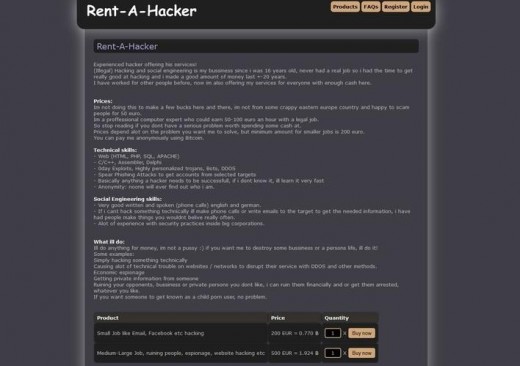
Hire A Hacker/Assassin/Rapist/Bad Guy Scam
Had a bad day? Think someone needs to die? Maybe the U.S. President has tweeted something to your dislike...and you feel the need to end him. Well, good news, now you can pull up your TOR browser and have him, or anyone else who has crossed you recently, "offed" for the low, low price of $15,000.
Yep. You read that right. For $15,000, U.S. dollars (or it's Bitcoin equivalent), you can hire a hitman...on the "dark web". If that's not your game or it's out of your price range, you can have them raped, tortured or beaten for a lower price.
Sound a little...too easy? It is. Though, having yet seen anyone purchase the service, the services seem a bit at odds for what those particular professions do. Hitmen with an online checkout cart that let you "plus one" services like a Walmart.com shopping spree? Better yet, hacking services at the exchange of a Bitcoin. Sure, all of the services offer "proof" that they've carried out the deed, but other than the hitman's product's obvious authentication (a dead body), what proof would you have of the others? Well, I mean any that you, as a layman would understand?
Better still, despite there being escrow services for Bitcoin holding, until "services are rendered", what are the chances of what you're seeing being "authentic"? Meaning, if you're emailed some agreed upon confirmation, what's to say it's not faked? Better still, what's to say that after receiving said confirmation, the hacker doesn't just turn on you for a bigger payout? Throw your name to the cops for a little more Bitcoin. The blowback is endless.
It might be cheaper just to do the deed yourself and far less risky.
Hackers are abound on the "dark web", that's for certain. They are for hire as well, but they're assuredly harder to find than a storefront website. Hackers are smart. Usually, the kind that would be hired for nefarious deeds; don't want to be found easily. If you are in the market, you'll have to do some serious deep digging into the blackest of the world wide web. Doubly so for people contracted for torturous services...and murder.

The Darknet Chronicles
The dark carnival ride that is the "deep web", is full of twists, turns, and scams aplenty. None of them in your favor, of course, but most tourists know that going in. The trick is to look,...but don't touch. Keep your money in your wallet, your hands in your pockets; ears and eyes open. Avoid the flashy signs strobing "Darkest Delights Delivered!" and "Dirty Deeds Done Dirt Cheap!", by using sound reason and logical deduction. What sounds too good to be true...usually is, especially on the "darknet".


